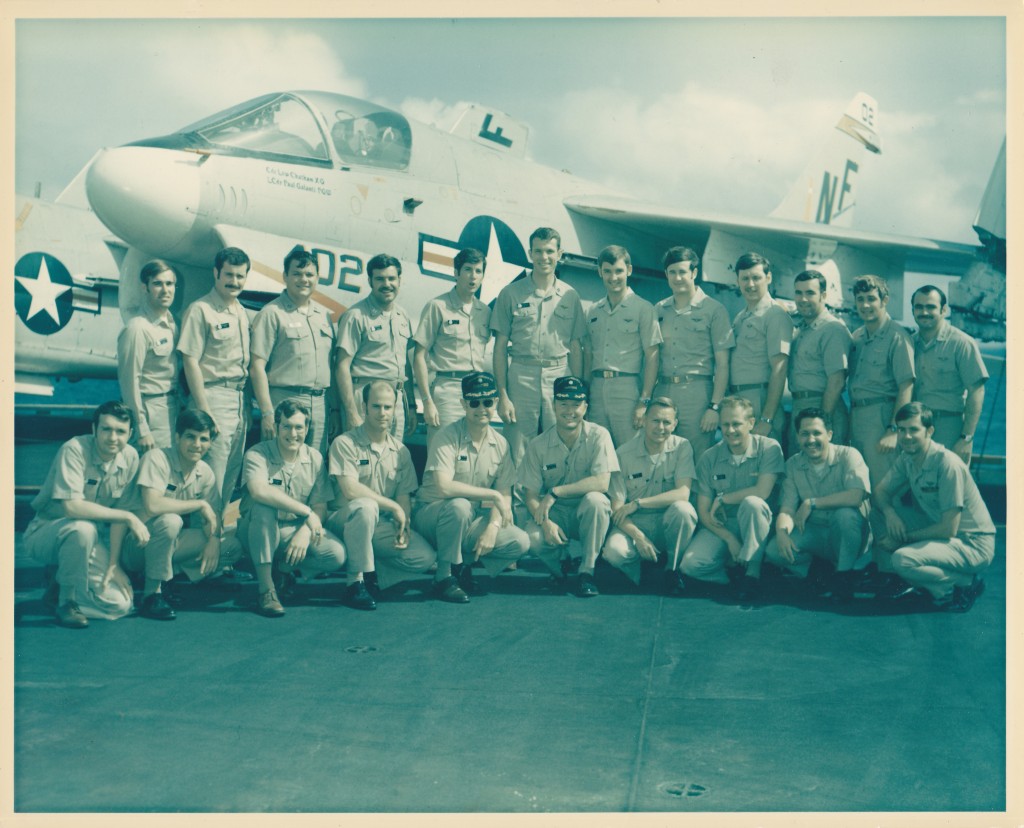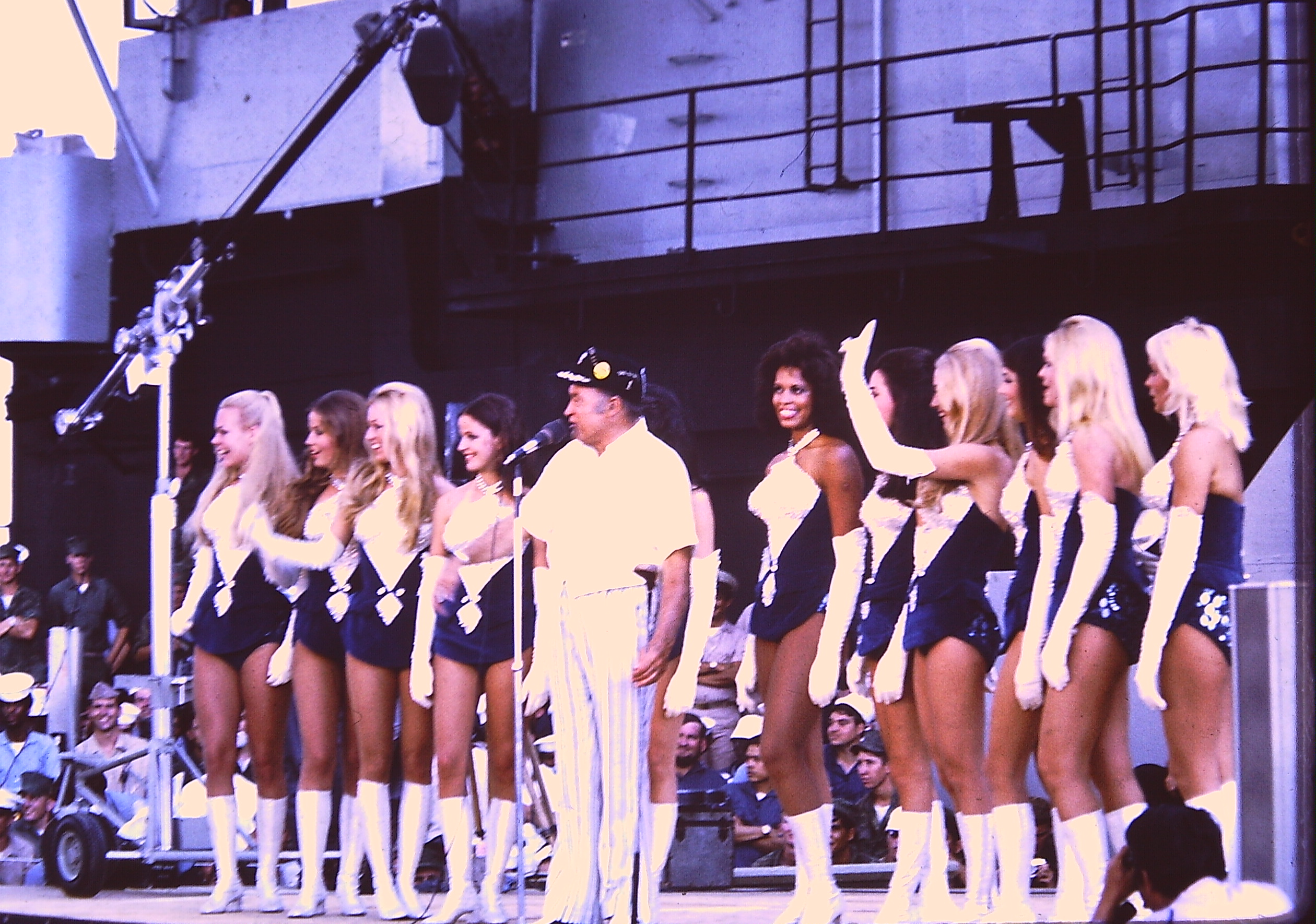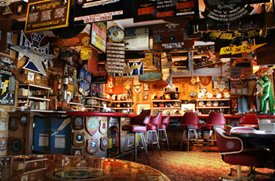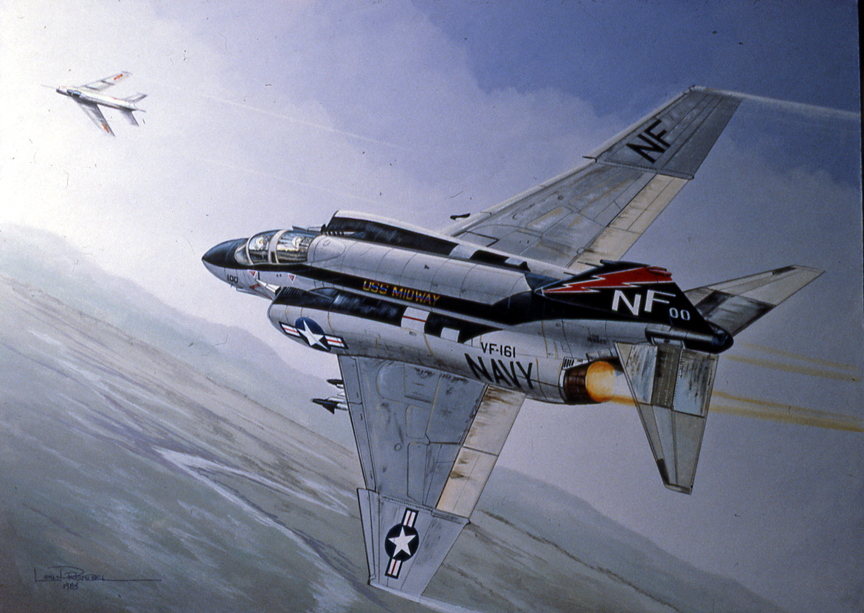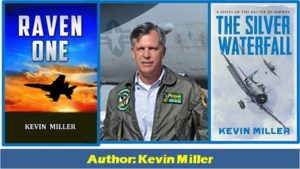With this post I begin a multi-story process centered on Linebacker II and Christmas 1972 as part of Remembered Sky’s overall reflection on the 40th anniversary of the end of that war and USS Midway/Carrier Air Wing Five’s war cruise in the Vietnam War. Midway/CAG 5 was the most experienced carrier in the Gulf of Tonkin as President Nixon determined to bring the war with full force of air power to Hanoi in December 1972 as peace negotiations broke down. Scheduled for Christmas R&R in Singapore, Midway remained on station flying Linebacker II operations until the morning of December 20th.
Bob Hope and friends on-board USS Midway, Singapore Harbor, Christmas 1972
Remembered Sky was introduced on September 15th of this year and that first post included the introductory piece of Ghosts Of Christmas Past written for Christmas 1999 in relation to the upcoming first meeting over the holidays with “Frenchy”- fellow Naval Aviator and future son-in-law. Ghosts offered the words of writers like James Michener and Herman Wouk as Christmas “ornaments” collected over a career and love affair with flying and Naval Aviation. Originally sent along the old-boy aviator e-mail chain, it was later published in MIG SWEEP, the magazine of the Red River Valley Fighter Pilots Association (River Rats), and then on Project White Horse 084640 as part of the 100th year anniversary of Naval Aviation.
I like these written ornaments and though I’ve posted them before, it seemed a good way to begin the stories from “America’s last battle in the Vietnam War.” One new ornament has been added.
War and remembrance… Merry Christmas to all and particularly to “these good men” still serving the United States of America.
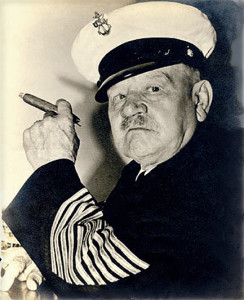 From every Chief Petty Officer I ever met
From every Chief Petty Officer I ever met
Pay attention, Sir. Learn, use it, and pass it on.
“Testimony of Pilot” from AIRSHIPS by Barry Hannah
He came down in an F-something Navy jet on the dot of ten. She ran out on the airport pavement to meet him. I saw her crawl up on the ladder. Quadberry never got out of the plane. I could see him in his blue helmet. Lilian backed down the ladder. Then Quadberry had the cockpit cover him again. He turned the plane around so its red flaming end was at us. He took it down the runway. We saw him leap out into the night at the middle of the runway going west, toward San Diego and the Bonhomme Richard. Lilian was crying.
“What did he say?” I asked.
“He said, I am a dragon. America the beautiful, like you will never know.” He wanted to give you a message. He was glad you were here.”
“What was the message?”
” The same thing. “I am a dragon. America the beautiful, like you will never know.’ “Did he say anything else?”
“Not a thing.”
“Did he express any love towards you?”
“He wasn’t Ard. He was somebody with a sneer in a helmet.”
“He’s going to war, Lilian.”
“I asked him to kiss me and he told me to get off the plane, he was firing up and it was dangerous.”
“Arden is going to war. He’s just on his way to Vietnam and he wanted us to know that. It wasn’t just him he wanted us to see. It was him in the jet he wanted us to see. He is that black jet. You can’t kiss an airplane.”
“And what are we supposed to do?” cried Lilian.
“We’ve just got to hang around. He didn’t have to lift off and disappear straight up like that. That was to tell us how he isn’t with us anymore.”
THE BRIDGES AT TOKO-RI by James a Michener
“How was Brubaker hit in the first place?”
“He was working over the dumps.”
“The admiral pounced on this. “What was he doing at the dumps?”
Patiently Cag explained. “Before we took off we agreed. If we get the bridges, we expend our ammo on the dumps.”
Icily from the empty bitterness of his bosom, the old man asked, “Was that wise?”
Cag had had enough. He’d stood this angry old tyrant long enough and there was no promotion in the navy that would make him take any more. “Admiral,” he said grimly, ” this was a good mission. We did everything just right. I put Brubaker in charge of the third division because I could trust him to fly low and bore in with his bombs. He did just that.”
Cag, trembling with anger, rushed on, “Admiral, everybody in the air group knows that you selected Brubaker as your special charge. You do that on every command and we know why you do it. Some kid your on boy’s age. So today I led your boy to death. But it was a good mission. We did everything just right. And it was your boy who helped destroy the bridges. Admiral, if my eyes are red it’s for that kid. Because he was mine too. And I lost him.”
The old man stood there, staring stonily at the shaking commander with the bullet head while Cag shot the works. “I don’t care any longer what kind of fitness report you turn in on me because this was a good mission. It was a good mission.” Without saluting he stormed from flag country, his fiery steps echoing as he stamped away.
For many hours the admiral remained alone. Then toward morning he heard the anti-submarine patrol go out and as the engines roared he asked, “Why is America lucky enough to have such men? They leave this tiny ship and fly against the enemy. Then they must seek the ship, lost somewhere on the sea. And when they find it, they have to land upon its pitching deck. Where did we get such men?”
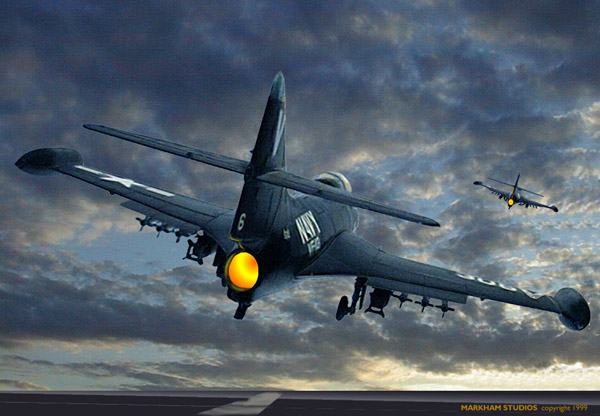
He went out to watch the launching of the dawn strike. As streaks of light appeared in the east, pilots came on deck…..Majestically, the task force turned into the wind, the bull horn jangled and a voice in the gloom cried, “Launch jets.”
Admiral Tarrant watched them go, two by two from the lashing catapult, planes of immortal beauty whipping into the air with flame and fury upon them. They did not waste fuel orbiting but screamed to the west, seeking new bridges in Korea.
FW: Cubi…’being there’ e-mail from “Turtle”
As I sat in the MD-11, flying back across the Pacific, I looked out the window at the water and the clouds and thought about all those people, those places and those great days. We all miss’em, but those days set us on the road to becoming effective people, they made us feel like true agents for our country and they taught us how to do big things in the world and not just root around in the pine trees of our little home towns, screwing around with old Mary Lou Rottencrotch.
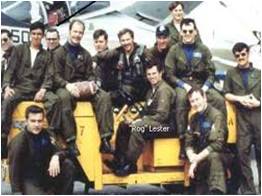
As we get older, my friends on this list, you guys who were there with me, are the most valuable things in my life. We were huge, weren’t we?
Don’t worry, Cubi lives.
Sadness and Hope: Some Thoughts on Modern Warfare from the Raymond A. Spruance Lecture at the Naval War College April 1980 by Herman Wouk
He introduced himself as Lieutenant Commander Williams, and added, “My name is Butch.” That was all I knew about him. I had to find out from others-never from him- that this man had flown four hundred combat missions in Vietnam; that he had five Distinguished Service Crosses and more decorations than I can begin to tell you; that he was an absolutely peerless professional fighting man and a first-class mind, number one in his class here at the Naval War College. So modest, so plain in his manner was he, that only after learning at second hand of his distinction did I come to observe the subtle clues of outstanding character of Butch Williams. I saw him several times after that. We were friends. I sent him a copy of War and Remembrance when it came out, and he wrote me a wonderful letter about it. At that time, after a lot of shore duty as an aide to Admiral Turner, he had just been
given the thing he had been waiting through all his naval career, command of a squadron on a carrier.
Two months ago, in routine duty at sea, Butch was being catapulted. The catapult failed and his plane fell in the sea. He ejected, but something went very wrong with the rescue procedure he was so familiar with, and Butch drowned. He isgone.
…..But what did Butch do with his death-this wonderful fighter, this first-class man who I believe would have been an important American leader, military and possibly more than military? What did he achieve with this accidental death in routine operations?
I’ll tell you what he did-he served. He was there.
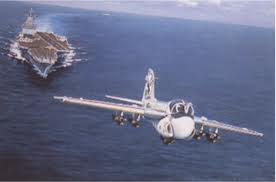
This man of the highest excellence submerged himself, his life, in this big destructive machine which is our solace and our protection, knowing full well that whether he flew combat missions or routine operations he was at risk. He gave up all the high-priced opportunities in this rich country-and the men in this room know what the advantageous offers and possibilities are outside the military life- and he served. While articles and books poured from the presses in New York and across the country about the doom of civilization, the collapse of Western society, the hopelessness and death of the American dream, Butch Williams served, and stood in the breach. For he knew that in this terrible fight against odds to hold the world together, while struggles out of the Thucydidean nightmare to the sunlight of Isaiah’s vision, American men must stand in the breach and face those odds and conquer those odds-the best men among us.
When Raymond Spruance sailed to Midway he was taking two carriers against nine; no battleships against perhaps twelve. …The victory that Spruance won against those rough odds, the stand of this one man in one dark hour on the Pacific Ocean near the island of Midway, turned the tide of history from the blackness of totalitarian barbarism into the troubled world we have today: a world-however troubled- in which we Americans can still talk as free men and work as free men toward the future.
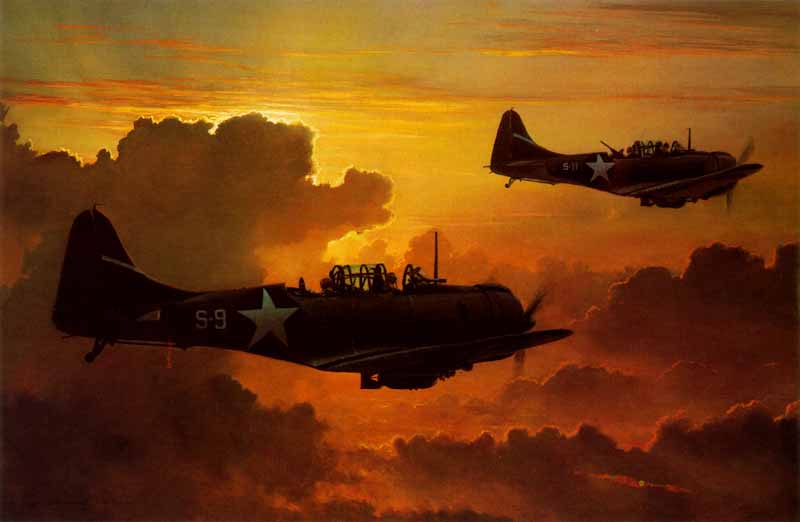
Mrs. Spruance remarked to me after my first lecture, “You know what Ray once said? He said there were a hundred Raymond Spruances in the Navy. They just happened to pick me to do the job.” I believe Spruance spoke the truth. There are hundreds of Spruances in this country…and there are thousands of Butch Williamses. We know about Spruance only because he was thrust into that battle and won it. We know about… Butch Williams because he died.
….. They are here among you…men who are such, or aspire to be such. I tell you that you are right in what you are doing, that you are answering the noblest of calls. In all my sadness, you are my hope.
The Truest Sport: Jousting with Sam and Charlie by Tom Wolf
Back on the Coral Sea Dowd and Flint were debriefed in the wardroom. They drank coffee and tried to warm up. The china had a certain dignity. It was white with bands of blue about the rims and blue crests here and there. The silver ware-now that was rather nice. It was ornamental and heavy. The questions came, one after the other, and they went through everything that happened. Yet during this debriefing the two men were waiting for something else. Surely, they would mention something else. But they didn’t. It was a debriefing much like every
debriefing. Just the facts! No quarter given! No slack in the line! Then the commander of their squadron said, with a note of accusation: “Why were you flying so low?”
Now, that really was too much! Why…. You bastard! But they said nothing, except the usual. What they wanted to say…well, how could they have put it into words? How, within the inner room, does one say: “My God, man, we’ve just been into the Jaws!… about as far into the goddamned Jaws as you can go and still come back again! and you want to know why we flew so low! We’ve just been there! At the lost end of the equation! where it drops off the end of the known world! Ask us about… the last things, you bastard, and we will enlighten you!
There were no words in the chivalric code for such thoughts, however. But all at once the skipper of the Coral Sea, the maximum leader, a former combat pilot himself, appeared-and he smiled! And that smile was like an emission of radio waves.
“We’re glad to have you back, men.”
That was all he said. But he smiled again! Such ethereal waves!
Invisible but comprehensible, they said, “I know. I’ve been there myself.” Just that! – not a sound! -and yet a doxology for all the unspoken things. How full my heart, O Lord!
Flint took off one day before going out on his next mission, on New Year’s Eve. Dowd had suffered a back injury in the ejection from the F-4B, and so it was another two days before he climbed back into the metal slingshot, got slung off the skillet, and went flying over North Vietnam again.
A GIFT OF WINGS by Richard Bach
And like no other sculpture in the history of art, the dead engine and dead airframe come to life at the touch of a human hand, and join their life with the pilot’s own. “When you believe in something as true as the sky,” he said. “you’re bound to find a few friends.”
To Pat, Carol, Matt stood in the breach, peace to you
To Frenchy, welcome to the family
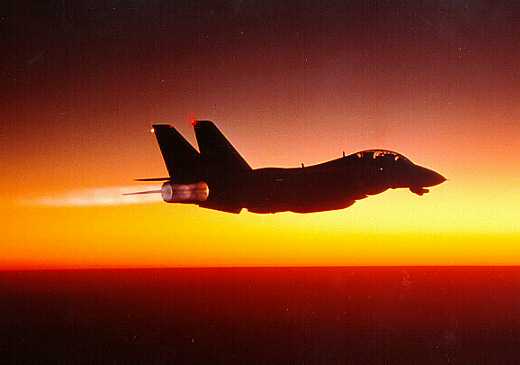
To All, FLY NAVY THE BEST ALWAYS HAVE….MERRY CHRISTMAS
Ed “Boris” Beakley
(Champ 9 VA-56 USS Midway Christmas ’72)
Update December 2010: So how’s that going so far?
Well, Tracey (made in Hong Kong on that fateful ’72 cruise) and Frenchy (1975 Operation Baby Lift) celebrated their 1oth anniversary this year, Frenchy retired from the Navy summer before last – the Tomcat pic is in his honor – and India’s now wearing Liam’s flight jacket. Going really well, I’d say. Fly Navy, the BEST did and will continue to do. Boris sends
Update Christmas Day, 2012: THESE GOOD MEN by Michael Norman
I now know why men who have been to war yearn to reunite. Not to tell stories or look at old pictures. Not to laugh or weep. Comrades gather because they long to be with the men who once acted their best, men who suffered and sacrificed, who were stripped raw, right down to their humanity.
I did not pick these men. They were delivered by fate and the Military. But I know them in a way I know no other men. I have never given anyone such trust. They were willing to guard something more precious than my life.
They would have carried my reputation, the memory of me. It was part of the bargain we all made, the reason we were so willing to die for one another. I cannot say where we are headed. Ours are not perfect friendships; those are the province of legend and myth. A few of my comrades drift far from me now, sending back only occasional word. I know that one day even these could fall to silence. Some of the men will stay close, a couple, perhaps, always at hand.
As long as I have memory, I will think of them all, every day. I am sure that when I leave this world, my last thought will be of my family and my comrades…..such good men.
